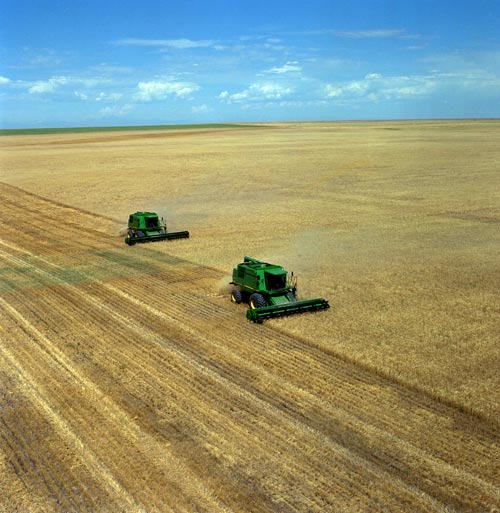
In recent weeks, two bills have been introduced aimed at increasing the amount of diesel fuel allowed to be hauled by agriculture sector employees – in some cases, from 118 gallons to 1,000 gallons -- without federal safety regulations kicking in. Long a thorn in the side of custom harvesters, the federal diesel fuel restrictions have been derided as overreaching and unnecessary.
The House legislation (H.R. 2429) “would help the agriculture industry operate more efficiently,” said Texas Rep. Randy Neugebauer, sponsor of the bill. “The bill is a common sense step that recognizes the needs of modern production agriculture.”
Kansas Sen. Pat Roberts – along with cosponsors Kansas Sen. Jerry Moran, Nebraska Sen. Mike Johanns and Nebraska Sen. Ben Nelson – has introduced S.1288, which would grant similar diesel-fuel hauling relief for agriculture-related businesses.
In late July, Delta Farm Press spoke with Tracy Zeorian, President of the U.S. Custom Harvesters Association. Zeorian, who operates a custom harvesting business with her husband, spoke on previous attempts to “fix” the regulations, the regulatory burden on harvesters, and the make-up of typical crews. Among her comments:
On what House H.R. 2429 and Senate S.1288 bills would do…
If passed, the legislation “will allow the producer, custom harvester and several other ag-related businesses to haul up to 1,000 gallons of diesel fuel in a tank without a hazmat endorsement on their Class A CDL.
“The Pipeline Hazardous Materials Safety Administration (PHMSA) and Federal Motor Carriers Safety Administration (FMCSA) regulations state a tank over 118 gallons is required to be ‘placarded.’ When it’s placarded, the tank falls into the Pipeline Hazardous Materials Safety Administration’s requirement which states the person hauling the tank must have the hazmat endorsement on their Class A CDL. That means they’ve been fingerprinted, gone through background checks, an extensive process by the U.S. Department of Transportation to be okay to haul what they call a ‘hazardous material.’
“Some people question whether that amount of diesel fuel is even a hazardous material.
“Regardless, once the tank is placarded, they must have the hazmat endorsement on their Class A CDL.”
On the burdens put on custom harvesters…
“It’s very difficult because most of the time the people hired to work on the custom harvest crews aren’t employed more than two or three weeks prior to leaving for the summer. There’s only a limited amount of work for them to do until harvest begins and the business owner doesn’t want a large payroll before hearing south.
“The hazmat endorsement requires at least a 90-day waiting period. Plus, there is an expense for fingerprinting, background check and whatnot.
“That expense usually isn’t an issue with the custom harvester simply because they need the hired help. The main issue is the 90-day waiting period. A large number of custom harvesters employ H2A foreign help – Americans are hard to find for the seasonal work.
“H2A employees aren’t eligible to even receive the hazmat endorsement. So, if you have a crew of eight or 10 foreign employees, the American business owner would be the only one who could have the hazmat endorsement. He’d be the one who’d have to haul the fuel to the field every morning and would be the one hauling the tank down the road when driving from job to job.
“By having the endorsement removed from the Class A CDL, some detrimental situations custom harvesters face could be eliminated.”
Limits
On the 1,000 gallon limit…
“The U.S. Custom Harvesters Association has been fighting for the 1,000 gallon limit for 20 years. This amount would be much more than many custom harvesters would use, for now. However, equipment continues to change and grow. Fuel is needed on a daily basis for combines, forage harvesters and tractors. Most combines hold approximately 250 gallons.
“A farmer currently has an exemption to haul up to 502 gallons of diesel fuel. The custom harvester is only allowed to haul up to 119 gallons.”
On how long it has taken to get traction on this issue…
“The legislation was only started this past spring.
“We’ve attempted anything and everything we could think of through the (PHMSA) and the (FMCSA). They listened to us for 20 years. We tried to create a pilot program, a rule-making change and other processes.
“Several of us went back to Washington, D.C., last spring and sat down with (U.S. Department of Transportation) officials. They finally just said ‘Look, we understand what you’re doing but we enforce the laws. If you want to change the laws, you’ll have to talk to the ones who make the laws.’
“So, that’s what we did. We finally found several (legislators) willing to create legislative wording. Senate Bill S.1288 was introduced … on June 28 and H.R. 2429 was introduced on July 6. … Both legislators have shown a true commitment to agriculture and realize this change in law would be a common sense fix to a burdensome regulation.”
Any idea when Congress might move on those?
“No. I’ve been told it’s unlikely that anything will happen very fast.
“They don’t think this will be passed by itself. It’s legislation that will probably have to be attached to a bigger bill like the transportation bill or the farm bill.”
Do you know how many custom harvesters there are in the United States?
“No. There are a lot of custom harvesters that, unfortunately, aren’t part of our group. U.S. Custom Harvesters has approximately 450 members.
“A typical crew is anywhere from two to four combines. Some have one combine and others have up to 30 combines. Members of the organization include custom forage harvesters and cotton harvesters. All harvesters will benefit from this law change.”
Anything else?
“We need people who are involved in agriculture to contact their senators and representatives today and ask them to support these bills by cosponsoring them. It’s very important.”
About the Author(s)
You May Also Like




